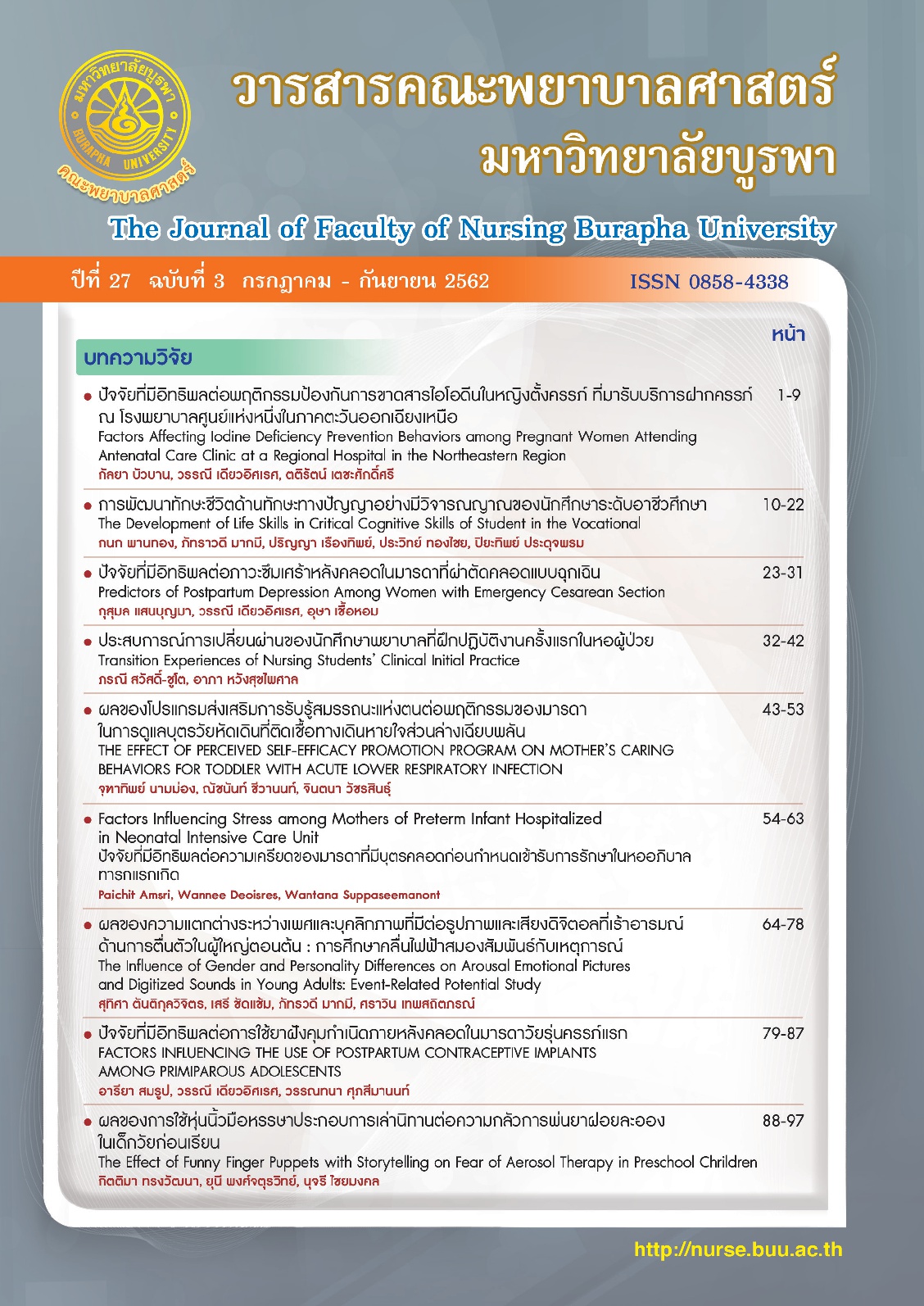ผลของโปรแกรมส่งเสริมการรับรู้สมรรถนะแห่งตนต่อพฤติกรรมของมารดา ในการดูแลบุตรวัยหัดเดินที่ติดเชื้อทางเดินหายใจส่วนล่างเฉียบพลัน
คำสำคัญ:
การรับรู้สมรรถนะแห่งตน, พฤติกรรมการดูแล, การติดเชื้อทางเดินหายใจส่วนล่างเฉียบพลันบทคัดย่อ
บทคัดย่อ
การวิจัยกึ่งทดลองนี้ มีวัตถุประสงค์เพื่อศึกษาผลของโปรแกรมส่งเสริมการรับรู้สมรรถนะแห่งตน
ต่อพฤติกรรมของมารดาในการดูแลบุตรวัยหัดเดินที่ติดเชื้อทางเดินหายใจส่วนล่างเฉียบพลัน กลุ่มตัวอย่าง คือ มารดาที่มีบุตรอายุ 1-3 ปี ที่ติดเชื้อทางเดินหายใจส่วนล่างเฉียบพลัน และเข้ารับการรักษาในหอผู้ป่วย
กุมารเวชกรรม โรงพยาบาลกระทุ่มแบน จังหวัดสมุทรสาคร เก็บข้อมูลระหว่างเดือนกรกฎาคม ถึงเดือนสิงหาคม พ.ศ. 2561 จำนวน 42 ราย เป็นกลุ่มทดลองและกลุ่มควบคุม กลุ่มละ 21 ราย กลุ่มทดลองได้รับโปรแกรมส่งเสริมการรับรู้สมรรถนะแห่งตน ส่วนกลุ่มควบคุมได้รับการพยาบาลตามปกติ เครื่องมือที่ใช้ในการวิจัย ได้แก่ โปรแกรมส่งเสริมการรับรู้สมรรถนะแห่งตน แบบบันทึกข้อมูลทั่วไป และแบบสอบถามพฤติกรรมของมารดาในการดูแลบุตรที่ติดเชื้อทางเดินหายใจส่วนล่างเฉียบพลัน ซึ่งมีค่าความเชื่อมั่นเท่ากับ .82 วิเคราะห์ข้อมูลด้วยสถิติพรรณนา และการทดสอบแบบสองกลุ่มเป็นอิสระต่อกัน (Independent t-test)
ผลการวิจัยพบว่า มารดากลุ่มที่ได้รับโปรแกรมส่งเสริมการรับรู้สมรรถนะแห่งตน มีผลต่างคะแนนเฉลี่ยพฤติกรรมในการดูแลบุตรวัยหัดเดินที่ติดเชื้อทางเดินหายใจส่วนล่างเฉียบพลันสูงกว่ากลุ่มที่ได้รับการพยาบาลปกติ อย่างมีนัยสำคัญทางสถิติ (p < .05) ผลการวิจัยครั้งนี้แสดงให้เห็นว่า พยาบาลที่ให้การดูแลเด็กควรนำโปรแกรมส่งเสริมการรับรู้สมรรถนะแห่งตนนี้ไปใช้กับมารดาที่มีบุตรวัยหัดเดินที่ติดเชื้อทางเดินหายใจส่วนล่างเฉียบพลัน เพื่อให้มารดามีพฤติกรรมในการดูแลบุตรได้อย่างมีประสิทธิภาพมากขึ้น
เอกสารอ้างอิง
Bandura, A. (1997). Self-efficacy: The Exercise of Control. New York: W. H. Freeman.
Ball, J. W., & Bindler, R. C. (2003). Pediatric nursing: Caring for children. (3rd ed).
Upper Saddle River, New Jersey: Prentice Hall.
Black, R.E., Morris, S.S., & Bryce, J. (2003). Where and why are 10 million children dying every year. THE LANCET, 361, 2226-2233.
Deangsuwan, T. (2016). Childhood asthma. DEPARTMENT OF MEDICAL SERVICES JOURNAL, 41(4), 5-15. [In Thai]
Ingram, J., Cabral, C., Hay, A., Lucas, P.J., & Horwood, J. (2013). Parents’ information needs, self-effcacy and influences on consulting for childhood respiratory tract infections: A qualitative study. Biomed Central Family Practice, 14 (106), 1-9.
Kaewsuk, C., Pongjaturawit, Y., & Chaimongkol, N. (2016). Factors associated with maternal behavior in prevention of acute respiratory infection in preschool children.
The Journal of Faculty of Nursing Burapha University, 24(4), 54-64. [In Thai]
Keeratiphakhawat, Y., & Rodcumdee, P. (2010). The effectiveness of using perceived self- efficacy in a program promoting maternal care to prevent recurrent pneumonia in toddlers. Journal of Nursing Science Chulalongkorn University, 22(1-3), 83-93. [In Thai]
Kotchabhakdi, N., & Empremsilapa, S. (2009). Psychosocial and behavior. In P Poomthavorn (Ed.), Textbook of Pediatric (pp. 142-150). Bankok: Thanaplace.
Kuntaros, S., Wichiencharoen, K., Prasopkittikun, T., & Staworn, D. (2007). Effects of family – centered care on self-efficacy in participatory involvement in child care and satisfaction of mothers in PICU. Thai Journal of Nursing Research, 11(3), 203-213.
[In Thai]
Piengjia, C. (2017). Effect of perceived self-efficacy enhancement program on caring behaviors among caregivers of children with acute respiratory infection. Master of Nursing Science Thesis, Pediatric Nursing, Faculty of Nursing, Burapha University.
[In Thai]
Preechapongmit, K., Lamchang,S., & Jintrawet, U. (2012). Factor related to caregiving burden among caregivers of children with asthma. Nursing Journal, 39(4), 13-22. [In Thai]
Rattanawong, A. (2008). The effect of perceived self-efficacy and social support promoting program on child caring behavior of mothers with acute respiratory infection children. Master of Nursing Science Thesis, Pediatric Nursing, Faculty of Nursing, Chulalongkorn University. [In Thai]
Samit, J., Lamchang, S., & Mesukko, J. (2013). Informational support, self-efficacy and parent participation in caring for hospitalized children with acute illness. Nursing Journal. 40(4), 114-125. [In Thai]
Slapak, I., Skoupa, J., Strnad, P., & Hornik, P. (2008). Efficacy of isotonic nasal wash(seawater) in the treatment and prevention of rhinitis children. Arch Otolaryngol Head Neck Surgery. 134(1), 67-74.
Tanajaroenchananchai, R., Pongjaturawit, Y., & Chaimongkol, N. (2013). Effect of the persiceived self-efficicacy promotion program on maternal confidence to program nasal irrigation for children with retained nasal secretion. The Journal of Faculty of Nursing Burapha University, 22(2), 28-38. [In Thai]
Wattana, P., Lamchang, S., & Tanasuwan, W. (2008). Effect of self-efficacy enhancement program on parents' behavior toward asthma prevention in children. Nursing Journal, 35(1), 68-78. [In Thai]





